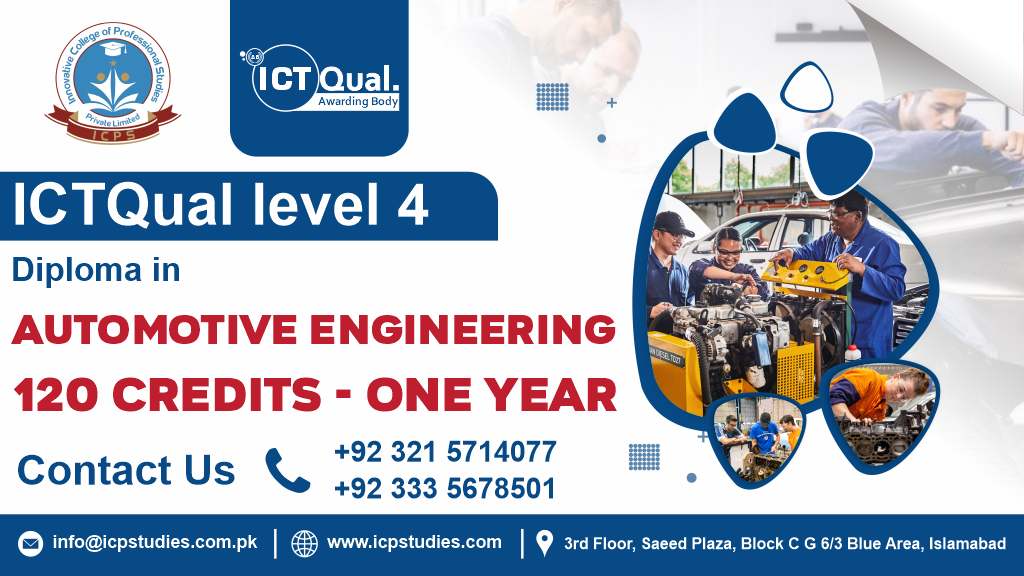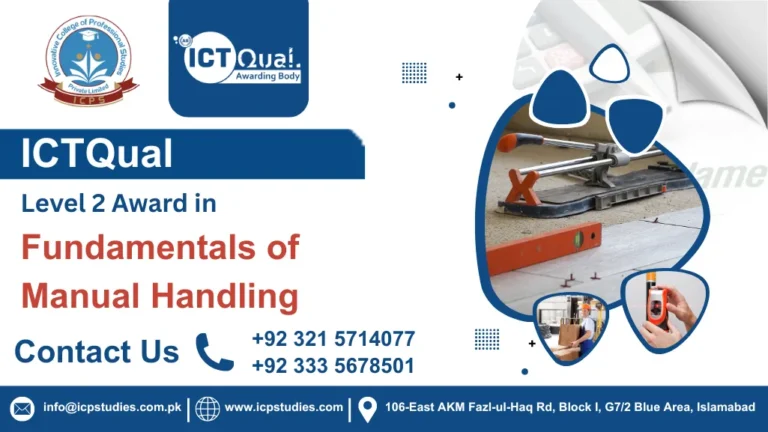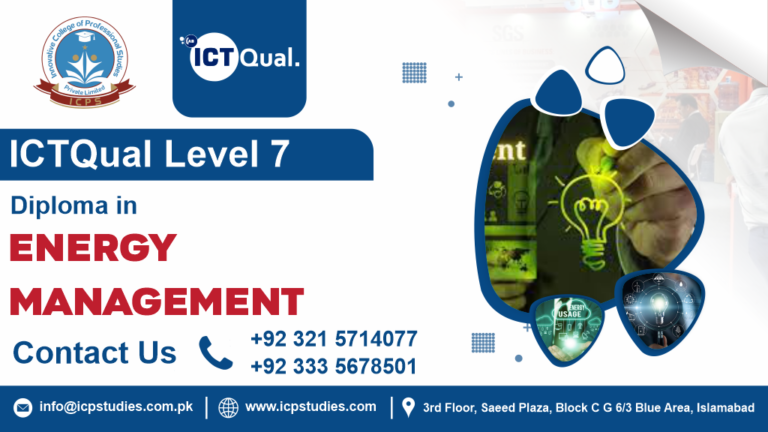Are you passionate about vehicles and technology? Do you want to build a successful career in the fast-paced automotive industry? The ICTQual Level 4 Diploma in Automotive Engineering is a one-year qualification designed to provide you with the advanced technical skills and knowledge needed to excel in this dynamic field. With 120 credits, this comprehensive course covers essential topics such as vehicle systems, design, diagnostics, alternative fuel technologies, and much more. Whether you’re just starting out or looking to advance your career, this diploma equips you with everything you need to become a skilled automotive engineer.
The ICTQual Level 4 Diploma in Automotive Engineering is an intensive, hands-on course designed for individuals who want to specialize in automotive engineering. Over the span of one year, this course blends practical experience with theoretical knowledge, ensuring you develop the skills needed to design, maintain, and troubleshoot modern vehicles. From internal combustion engines to electric and hybrid vehicle technologies, this diploma prepares you for a wide range of roles in the automotive sector.
The ICTQual Level 4 Diploma in Automotive Engineering is the ideal choice for anyone looking to build or advance their career in the automotive industry. With its comprehensive curriculum, hands-on learning approach, and industry relevance, this diploma will prepare you for a wide variety of roles, from vehicle design to diagnostics and project management. If you’re ready to take the next step in your automotive engineering career, this course provides the knowledge, skills, and credentials you need to succeed in this exciting field. Get started today and drive your career forward!
All About ICTQual Level 4 Diploma in Automotive Engineering 120 Credits – one year
Course Overview
The ICTQual Level 4 Diploma in Automotive Engineering is a comprehensive one-year qualification designed for individuals looking to build a career in the ever-evolving automotive industry. With 120 credits, this course provides advanced technical knowledge and practical skills essential for professionals in the field of automotive engineering.
As the automotive industry undergoes rapid changes with the rise of electric vehicles, autonomous driving technologies, and advanced vehicle systems, this diploma equips learners with the expertise needed to stay ahead. The curriculum covers a wide range of topics, from vehicle design, engine performance, and diagnostics to modern trends like alternative fuels and sustainable manufacturing practices.
Whether you’re an aspiring automotive engineer or looking to advance your career in vehicle design, diagnostics, or project management, this qualification offers the right balance of theoretical knowledge and hands-on experience. Upon completion, students will be well-prepared to take on key roles in automotive engineering, including vehicle system design, maintenance, and innovation.
Study Units
- Vehicle Systems and Components
- Automotive Electrical and Electronic Systems
- Vehicle Diagnostics and Fault Finding
- Hybrid and Electric Vehicle Technologies
- Automotive Engine Design and Performance
- Automotive Materials and Manufacturing Processes
- Vehicle Safety and Crash Testing
- Automotive Fuel Systems and Emissions Control
- Automotive Air Conditioning and Climate Control Systems
- Automotive Project Management
- Advanced Vehicle Technology and Autonomous Systems
- Automotive Industry Regulations and Standards
To enroll in the ICTQual Level 4 Diploma in Automotive Engineering, applicants must meet the following entry requirements:
- Minimum Age: Applicants must be at least 18 years old at the time of enrollment.
- Academic Qualifications:
- A Level 3 qualification in an engineering or automotive-related field, such as the ICTQual Level 3 Diploma in Automotive Engineering, or equivalent.
- Alternatively, applicants with relevant experience in the automotive industry (such as a technician or mechanic role) may be considered if they have a solid understanding of basic automotive systems and principles.
- Mathematics and Science Knowledge:
- A basic understanding of mathematics and science, particularly in areas such as physics, mechanics, and electronics, is recommended. This will help students grasp key concepts in automotive engineering.
- English Language Proficiency:
- Applicants must have a good command of the English language, both written and spoken, to be able to understand course materials, complete assignments, and engage in practical sessions.
- If English is not the applicant’s first language, they may need to provide evidence of English proficiency (e.g., IELTS score of 6.0 or equivalent).
- Personal Motivation and Interest:
- A keen interest in the automotive industry and a passion for learning about vehicle systems, design, and technology are essential. Applicants should be prepared for a challenging, hands-on learning experience.
- Work Experience (Optional):
- Previous work experience in the automotive or engineering field is advantageous but not mandatory. Practical experience will support understanding of theoretical concepts during the course.
Applicants who meet these entry requirements will be considered for enrollment into the ICTQual Level 4 Diploma in Automotive Engineering, and will be guided throughout the course by expert instructors to ensure successful completion.
The ICTQual Level 4 Diploma in Automotive Engineering (120 Credits – One Year) is ideal for a range of individuals looking to advance or start their career in the automotive industry. This course is designed for:
- School Leavers: If you have recently completed your secondary education and have an interest in vehicles and technology, this diploma provides a solid foundation to begin a career in automotive engineering.
- Career Changers: If you’re looking to switch from another industry into automotive engineering, this course offers a comprehensive introduction to automotive systems and technologies, allowing you to build the necessary skills to enter this dynamic field.
- Automotive Technicians and Mechanics: If you already work as a technician or mechanic in the automotive industry and wish to advance your skills to more specialized roles, this diploma will help you gain deeper knowledge in vehicle design, diagnostics, and modern automotive technologies such as electric and hybrid vehicles.
- Aspiring Automotive Engineers: If you want to pursue a career as an automotive engineer, working in vehicle design, testing, or production, this course will give you the advanced technical skills required to work in high-level engineering roles within the automotive industry.
- Engineering Professionals: If you are already an engineering professional looking to specialize in automotive engineering, this diploma will enhance your knowledge in areas like vehicle systems, safety standards, and emerging technologies like autonomous driving and electric vehicles.
- Automotive Enthusiasts: If you have a strong passion for cars, technology, and innovation and are eager to turn that passion into a career, this course will provide you with the technical expertise to pursue your interests professionally.
No matter your background, if you’re interested in automotive engineering and eager to learn about vehicle systems, modern technologies, and industry trends, this course will help you take the next step in your career.
Learning Outcomes
Upon successful completion of the ICTQual Level 4 Diploma in Automotive Engineering (120 Credits), students will be able to demonstrate the following learning outcomes across the 12 study units:
1. Vehicle Systems and Components
- Understand the fundamental components of automotive systems, such as the engine, transmission, suspension, braking systems, and steering.
- Explain how each vehicle system functions individually and as part of the overall vehicle operation.
- Analyze the interdependencies of various vehicle systems and their impact on vehicle performance, safety, and efficiency.
2. Automotive Electrical and Electronic Systems
- Demonstrate an understanding of automotive electrical circuits, including wiring, battery systems, and control units.
- Assess the role of electronics in vehicle control systems, including sensors, actuators, and safety features.
- Apply diagnostic tools to identify faults in electrical and electronic systems, including wiring and component-level troubleshooting.
3. Vehicle Diagnostics and Fault Finding
- Identify common faults in vehicle systems, including engine management, electrical, and mechanical components.
- Utilize automotive diagnostic tools and techniques to perform fault diagnosis and recommend appropriate repairs.
- Evaluate diagnostic reports to determine the underlying issues affecting vehicle performance and safety.
4. Hybrid and Electric Vehicle Technologies
- Understand the design, operation, and components of hybrid and electric vehicles, including batteries, drivetrains, and electric motors.
- Compare and contrast the technologies behind electric and hybrid vehicles versus traditional internal combustion engine vehicles.
- Assess the maintenance and servicing needs of hybrid and electric vehicles, including battery management systems and charging infrastructure.
5. Automotive Engine Design and Performance
- Analyze the design principles behind internal combustion engines, including performance characteristics, fuel systems, and exhaust systems.
- Evaluate engine performance through key metrics such as power output, fuel efficiency, and emissions.
- Apply tuning techniques to optimize engine performance, ensuring compliance with industry standards for efficiency and emissions.
6. Automotive Materials and Manufacturing Processes
- Identify and describe the materials used in vehicle construction, such as metals, composites, and polymers.
- Understand the manufacturing processes involved in vehicle production, including casting, welding, and assembly.
- Evaluate the role of material selection in vehicle safety, performance, and cost-effectiveness.
7. Vehicle Safety and Crash Testing
- Understand the principles of vehicle safety design, including passive and active safety features like airbags, seatbelts, and stability control systems.
- Analyze crash testing procedures and their role in improving vehicle safety standards.
- Assess the performance of safety systems in real-world accident scenarios and their regulatory compliance.
8. Automotive Fuel Systems and Emissions Control
- Understand the operation and components of automotive fuel systems, including carburetors, fuel injectors, and fuel pumps.
- Examine the environmental impact of vehicle emissions and evaluate the technologies used for emissions control, such as catalytic converters and exhaust gas recirculation.
- Apply knowledge of fuel systems and emissions control to ensure compliance with regulatory standards and reduce environmental impact.
9. Automotive Air Conditioning and Climate Control Systems
- Understand the principles of automotive air conditioning systems, including refrigerants, compressors, condensers, and evaporators.
- Demonstrate the ability to diagnose faults and perform maintenance on air conditioning and climate control systems.
- Evaluate energy-efficient technologies in automotive HVAC systems, including eco-friendly refrigerants and alternative cooling methods.
10. Automotive Project Management
- Apply project management principles to automotive engineering projects, including scheduling, resource allocation, and cost estimation.
- Evaluate the role of project management tools and software in tracking project progress and ensuring quality control.
- Manage automotive engineering projects effectively, meeting deadlines and staying within budget while maintaining high standards of quality.
11. Advanced Vehicle Technology and Autonomous Systems
- Understand the principles behind autonomous driving technologies, including sensors, machine learning, and data processing.
- Examine the different levels of autonomy in vehicles and the associated benefits and challenges.
- Assess the impact of advanced vehicle technologies on safety, regulations, and industry standards.
12. Automotive Industry Regulations and Standards
- Understand the legal and regulatory frameworks that govern the automotive industry, including safety standards, emissions regulations, and homologation requirements.
- Evaluate how industry standards, such as ISO certifications, influence vehicle design, manufacturing, and safety.
- Assess the importance of compliance with regulatory bodies in ensuring the safety, environmental sustainability, and marketability of vehicles.
FAQs about ICTQual Level 4 Diploma in Automotive Engineering 120 Credits – one year







